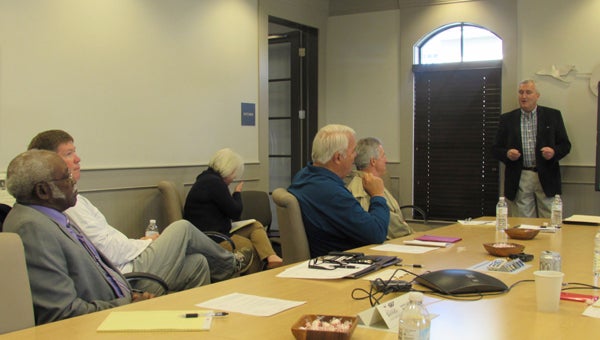City Council discusses tourism during retreat
Published 5:33 pm Thursday, April 14, 2016

MIKE VOSS | DAILY NEWS
INITIATING INPUT: David Long (standing), facilitator at the City Council’s retreat Saturday, encourages council members to identity the top issues facing the city.
Enhancing the city’s tourism efforts — especially marketing the city as a multi-day destination instead of a day-trip locale — is something city needs to further emphasize, according to Washington City Council members who attended a retreat Saturday at Washington-Warren Airport.
The discussion ranged from making the city’s downtown cleaner and more visually appealing to a fueling station for boats at the waterfront to developing a plan to draw more visitors to the city and implementing that plan as an economic-development tool. Mayor Mac Hodges said the decline of the city’s industrial economy in the past 30 years puts the city in a position to use tourism as an economic driver in the future.
Many of the top priorities the council identified during the retreat have some connection to tourism.
Councilman Larry Beeman wants the city to further expand its travel-sports market, doing what it can to bring in more multiple-day tournaments. Beeman believes such tournaments help the city’s economy because team members, their parents and officials spend money at local hotels, restaurants and other businesses during their stays.
Mayor Pro Tempore Virginia Finnerty, who owns a bed-and-breakfast, asked her council colleagues to consider ways to improve the city’s tourism efforts, including an approach titled The 20 Ingredients of an Outstanding Destination.” She considers it a workable approach to increasing tourism.
“I want to turn the potential into reality,” Finnerty said about making tourism a key element of the city’s economic-development strategy.
Councilman Doug Mercer wondered what attracts visitors to Washington.
“Because of my exposure to tourists who come into town, I know what brings them. What brings them here is that it is a small, quaint, quiet town,” Finnerty said, noting that she doesn’t want to see those qualities affected too much. “We need to be very careful what we do because we may ruin the jewel that we have.”
Finnerty believes Washington can learn from other small towns that have seen their tourism efforts flourish. Finnerty said her research indicates many visitors — about 65 percent — to her bed-and-breakfast and others in the state are North Carolina residents exploring their home state.
For at least 20 years, the Washington Tourism Development Authority has been marketing the city, and to some degree Beaufort County — to tourists. A significant amount of occupancy-tax revenues are used to fund programs and projects intended to bring more people for overnight stays to areas served by agencies like the WTDA. The WTDA allocates two-thirds of its annual revenue to promote travel and tourism and the remaining third on tourism-related expenditures, according to the Magellan report.
Gross revenue generated by Washington’s 6-perccent occupancy tax increased nearly $13,000 in fiscal year 2014 when compared to the previous fiscal year, coming in at $222,208, according to figures provided by city and state officials.
The city realized $209,346 in gross revenue from the occupancy tax in fiscal year 2013.
Lynn Wingate, Washington’s tourism-development director, wrote in an email:
“The occupancy tax figures for fiscal year 2014 reflect a direct effort to market Washington to external areas. In March of 2013, we launched a new website. Travel spurred by the new site occurred during FY2014.
Visitor spending in Beaufort County increased by 6.6 percent from 2013 to 2014, one of the biggest increases among the state’s 100 counties, according to a study.
From 2013 to 2014, visitor spending in Beaufort County rose from $70.99 million to $75.68 million, according to the study.






